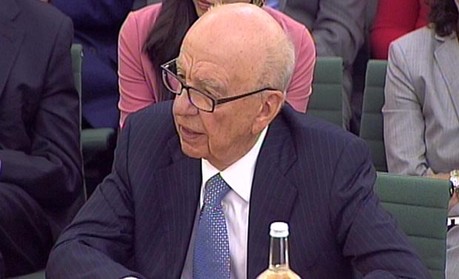
Rupert Murdoch appears before the culture, media and sport select committee
The home affairs committee has accused News International of attempting to "deliberately thwart" the original investigation into phone hacking.
In a report published today, the committee said it "deplores" News International's behaviour but also claimed police "set aside a huge amount of material that could have identified other perpetrators and victims".
Just yesterday News Corporation boss Rupert Murdoch and his son James, chairman of News International, appeared before the culture, media and sport select committee.
Giving evidence, James Murdoch said, at the time of the original investigation, "certain things were not known" and when the new information came to light "the company acted on it in a right and proper way".
He added that the "pushback, or denial of veracity of allegations made in 2009, had been too strong and that's a matter of real regret because all the facts were not known when that was done".
In the past weeks the home affairs committee, which published its report this morning, has heard evidence from a number of senior Metropolitan police figures.
This included, on two occasions, John Yates, who resigned from his post as assistant commissioner on Monday.
In today's report, the committee said it agreed with Yates' assessment that his 2009 review of the earlier investigation was "very poor" and that he made a "serious misjudgement".
"Although what Mr Yates was tasked to do was not a review in the proper police use of the term, the public was allowed to form the impression that the material seized from Mr Mulcaire in 2006 was being re-examined to identify any other possible victims and perpetrators.
"Instead, the process was more in the nature of a check as to whether a narrowly defined inquiry had been done properly and whether any new information was sufficient to lead to that inquiry being re-opened or a new one instigated."
The Wallis contract
Yates' resignation, as well as the stepping down of Sir Paul Stephenson as commissioner, followed criticisms of the hiring of former News of the World executive Neil Wallis by the Metropolitan police as a PR advisor in 2009.
Yesterday it was announced that Dick Fedorcio, director of public affairs for the force, had been referred to the Independent Police Complaints Commission, in light of "high-level interest" in his relationship with Wallis.
Yates had also been referred to the police complaints body prior to giving his resignation.
Today the home affairs committee said it was "appalled" at learning of the details of the Wallis contract.
"We are particularly shocked by the approach taken by Mr Fedorcio: he said he could not remember who had suggested seeking a quote from Mr Wallis; he appears to have carried out no due diligence in any generally recognised sense of that term; he failed to answer when asked whether he knew that AC Yates was a friend of Mr Wallis; he entirely inappropriately asked Mr Yates to sound out Mr Wallis, although he knew that Mr Yates had recently looked at the hacking investigation of 2005-06; and he attempted to deflect all blame on to Mr Yates when he himself was responsible for letting the contract."
Current investigations
The committee also reflected on evidence given by Sue Akers, the officer overseeing Operation Weeting, the investigation into phone hacking and Operation Elveden, which is looking into alleged payments to police officers for information.
The committee said it is "alarmed" that only 170 potential victims have been informed so far and calls for extra resources to be allocated to her investigation.
It also calls for additional powers to be awarded to the information commissioner to deal with breaches of data protection.
According to today's report, most witnesses appearing before the committee claimed to be unaware of the information commissioner's two 2006 reports, What price privacy? and What price privacy now?, at the time of their publication.
"There has been a catalogue of failures by the Metropolitan police and deliberate attempts by News International to thwart the various investigations," committee chair Keith Vaz said in a release.
"Police and prosecutors have been arguing over the interpretation of the law.
"The new inquiry requires additional resources and if these are not forthcoming, it will take years to inform all the potential victims. The victims of hacking should have come first and I am shocked that this has not happened."
News International had not responded to a request for comment at the time of writing.
Free daily newsletter
If you like our news and feature articles, you can sign up to receive our free daily (Mon-Fri) email newsletter (mobile friendly).









